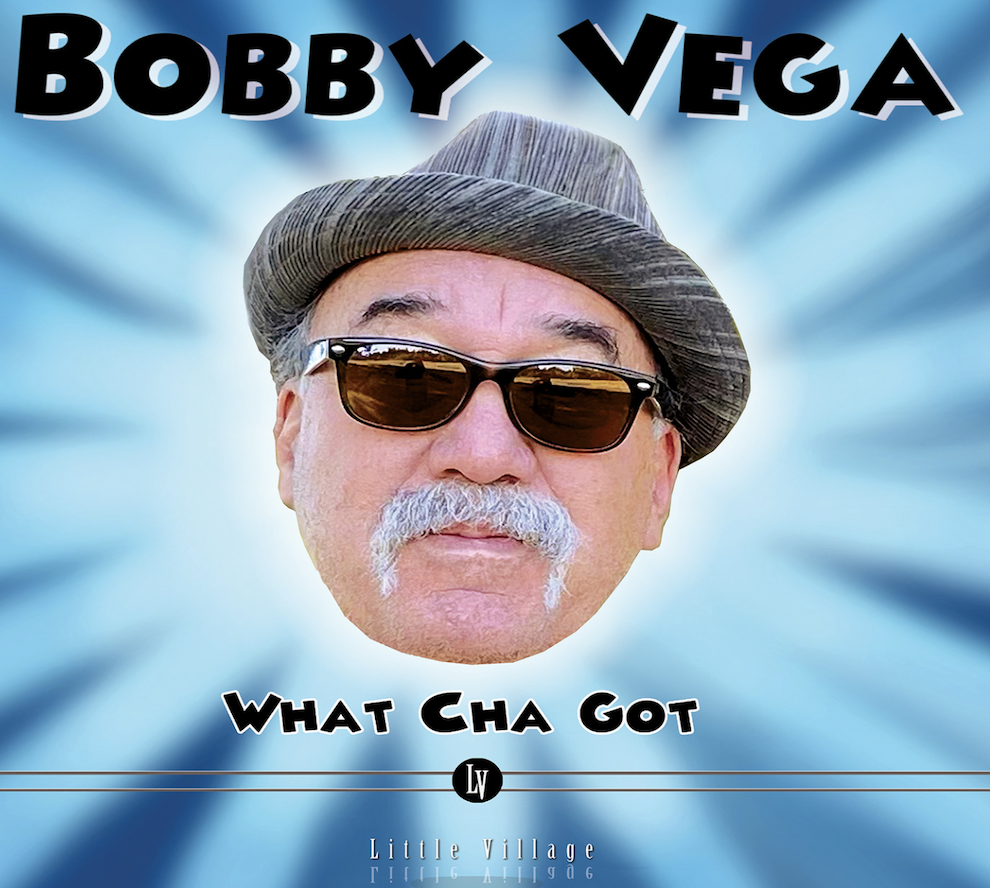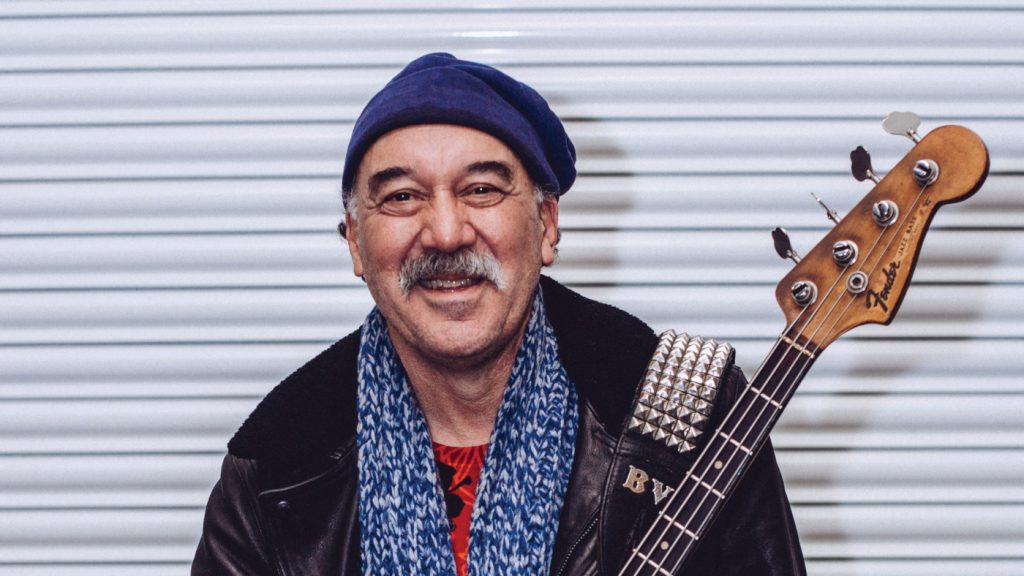Bobby Vega’s just released album asks the question What Cha Got?
Turns out, quite a lot. With half a century of playing bass with some of the world’s biggest superstars and musical geniuses, this veteran composer, producer, and teacher has turned out an album of nine instrumentals that are a mind-bending tour de force, a veritable funk-soul-rock-jazz encyclopedia that features incredible musicianship by Jim Pugh (piano/Hammond B3 organ), Kid Andersen (guitar/upright bass), Chris Rossbach (guitar), Alan Hertz (drums), CVS (strings) Jens Kruger (banjo) and ex-Tubes and all-Bay Area drummer Prairie Prince.
Bobby’s resume includes gigs with everyone in the Grateful Dead, and What Cha Got demonstrates originals that reflect the eclecticism of having played with everyone from Babatunde Olatunji to Paul Butterfield, Cold Blood to Etta James, and Carlos Santana to Booker T.
“The music is in my DNA, says Bobby. “All these different musics are all in me, and when I play, my music comes out of me because my music has been my therapist. No matter what has happened – wives or whatever are gone – but my instruments are still with me. When I played with Paul Butterfield, I didn’t know how to play the blues. Well, they just played music, but after playing with them, and then not having that gig, you start to have a bead on it. Years later, you see where that has come out in my playing.”

The new album was recorded for Jim Pugh’s Little Village. At first blush What Cha Got might seem to be an anomaly for The Little Village label whose primary releases are by African American musicians with little exposure to mass audiences, but label principles Jim Pugh and Kid Andersen are alchemists experienced in bringing out the best in great musicians who otherwise might get lost in the music industry’s rush to produce million sellers.
“I’ll tell you why (I recorded with them) They’re both about music. Don’t get me wrong. I always made my own gravy. I’ve played with Sly and Billy Preston, Denice Williams, Tower of Power, Etta James, Paul Butterfield, So, they didn’t get no newbie. They didn’t get no wannabe. I already did it for 50 years.”
Bobby played with his first headliner, Bo Diddley, when he was 15. At the time he didn’t know diddley, literally. “I had a job. I’d quit school, and started working at a huge cool music store that had all the cool stuff you’d see at concerts.
“I worked at the warehouse, and so what they would do is they’d go, ‘Hey, you don’t mind if we get our warehouse boy to demonstrate.’ So, they would plug me in, and they would go through all these different cabinets and amplifiers because they had all these hookups where they would mix and match the cabinets, and I would come out.
“They would turn on all the knobs and do all that. Then I’d go back in the warehouse, and they’d call me up and say, ‘Hey Bobby, get me a PD215 with a dah, dah, dah’ because they would sell that after I’d demonstrated it. This one guy named Jake who was a great guitar player said, ‘Hey, man, you want to play with Bo Diddley?’ I didn’t even know Bo Diddley from what. ‘Yeah, sure.’ So, I got to play at the Fremont Dragstrip at a pickup gig. I didn’t do this gig well, but after the gig he gave me $75 in single dollar bills and said, ‘You did well, boy.’”
Bobby was hooked.
The 11 originals on What Cha Got all have backstories based on Bobby’s life in the fast lane. He blends rock, funk and jazz in an instrumental showcase of nine original instrumentals that prove that this man has been around the world more times than he can count and creates music inspired by those backstories.
‘“Helicopters’ happened because Bill Graham passed away (in a helicopter crash), and Bill Graham in ’66 and ’67 was one of the biggest reasons I play music. If I look at it and go backwards and tell the story, he was FM radio in my life. Bill Graham came to town (San Francisco) and brought all these acts, and different mix and stuff to the Fillmore. You get a chance to see live music in front of your face, and not on an album that they’re making.
“It was fresh! In front of you! In other words, they’re playing the song, but they’re playing in the moment. Now, people are calling it improvisational music, but they were in the moment playing live music, and you’re right in front of the amps and all. Bill always encouraged me. On his way out the door he told me he has a helicopter now to get to all the events that he was throwing. That’s the last time I saw Bill.”
‘“Skunk Train’ is so cool because it has so many different things to it. I went to the Columbia Park Boys Club in San Francsico as a kid, and they sent me to summer camp in Mendicino, and the train that passed through the camp was the skunk train. It would deliver all the stuff to the PX that you were able to buy like corn nuts, Coca Cola and all that. The skunk train would deliver all this, right?
“Well, fast forward. About four years ago I played a couple of parties on the skunk train. So, you’re playing music on this train, and everybody is just whooping it up and drinking and smoking, dancing, laughing. So, that’s an adventure being on that train.
The title track “What Cha Got” comes from Bobby’s girlfriend Kimmie who would bring all sorts of goodies to a party, and Bobby would ask her “Hey Kimmie, what Cha Got!”
“Gush Say Hey” is about Willie Mays, one of Bobby’s childhood Heroes.
“Can’t Wait” refers to the anticipation of seeing and conjuring up the spirits of Jimi Hendrix and Jerry Garcia.
“Happy Me, Happy You” is about when we’re happy, you’re happy, Bobby’s happy.”
Babatunde Olatunji is considered by many to be the greatest drummer who ever lived. The Grammy winner toured with Mickey Hart in Planet Drum. Bobby Vega’s experiences with him help explain Bobby’s karma. When I brought Baba up to Bobby in our interview, he exclaimed, “Ooh, that was deep! You know as you go through life you meet people that have an aura, and Baba had that almost like a Stevie Wonder.”
Bobby describes one gig he did with the Baba in New York. “We get to the subway with all the band suited up. They’re playing drums on the subway all the way to the gig. We get off. He’s still drumming, walking to the venue, walking right to the stage, playing (makes percussive noise) right on the stage. It was very cool, a lifetime experience.”

